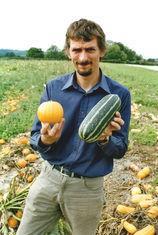
Over 20 different English bred salads, vegetables and herbs, multiplied by numerous varieties under trial from as far afield as Japan and the United States, will form the showcase for Tozer Seeds of Cobham, Surrey, at its open days on September 12-13.
The rejuvenated event, which was last held 10 years ago, is already said to be attracting wide interest, not just from both large and smaller scale growers, but also supermarket technologists and international visitors, revealed technologist Jim Juby (pictured).
In the last decade independent vegetable breeder Tozer, which has occupied the 11 acre site on the edge of the village for over 60 years, has widened its interests and now has trial sites overseas and partnership relationships with specialist international breeders.
“We will be unveiling new breeding material which will become commercial within 18 months,” said Juby. “And we are particularly aiming to attract middle sized and smaller growers to see our field trials, and give them increased access to what is now being required by the end customer.”
Overall interest in growing more vegetables and root crops in the UK, including the resurgence of traditional English varieties has quickened, harnessed by the impact of the food miles debate. And conversely many of these crops such as parsnips are now being discovered abroad.
Many UK supermarkets reflect this trend by presenting often long forgotten types with the emphasis on their special flavour and limited availability. “Actually there is nothing new in the vegetable world,” says Juby. “But what we are seeing is the next improved generation which are easier to grow, have higher yields but still retain their unique characteristics.”
Examples of what visitors can expect include one of the most substantial lettuce trials that Tozers has ever undertaken, concentrating on improved leaf colour and texture. Additionally, the results of a new iceberg programme developed in the States will be on show.
In so doing a two way conduit has been created and now successfully applied to export a range of baby leaf seed to the United States.
Another aspect has been the development of spinach resistant to downy mildew. The establishment of savoy types which instead of being flat leafed are, as Juby puts it, ‘three dimensional’, has created more varieties more suited to prepacked salad mixes, lifting the crop away from being a commodity item.
Rocket has also entered this sector and different leaf shapes and flavours have arrived, based on breeding programmes from the wild counterpart.
Tozer is also operating an extensive runner bean programme, developing both red and white flowering varieties such as in the former instance, Aintree. This has already impressed because of its size and shape as well as tolerance of high temperatures.
There will be an update on new selections of butternut squash, which saw a breakthrough some three years ago allowing the crop to be grown in cooler, more northern areas of the country.
These will be alongside pumpkins, which are available in an even greater diversity of sizes, shapes and colours.
Apart from having the opportunity to look behind the scenes at selection, processing treatments and dispatch, emphasis will be on how Tozers is already responding to the change in agronomy.
“With reduction, and in some cases virtual disappearance of chemical treatments on crops such as sweetcorn, beans, and rocket, the industry is having to rethink its practices,” he added. l



